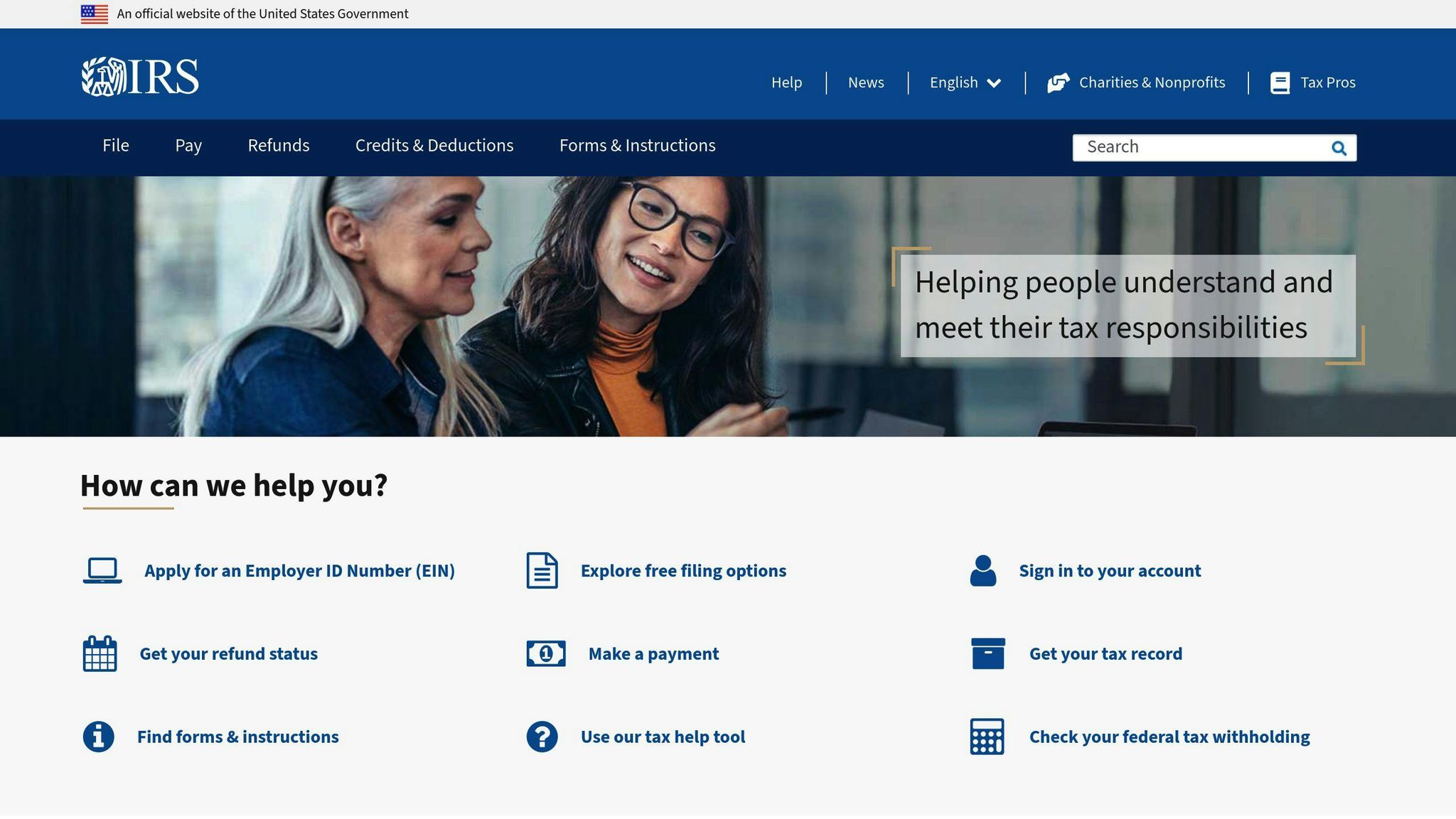Tax Benefits of Church Nonprofit Status: A Complete Guide
Explore the tax benefits of nonprofit status for churches, including exemptions and compliance requirements, to enhance their financial health.

Churches with nonprofit status enjoy automatic tax exemptions that save money and support their missions. Here's a quick breakdown of the key benefits:
- No Federal Income Tax: Churches keep all earnings from their mission work, saving thousands yearly.
- Tax-Deductible Donations: Donors can claim tax breaks, encouraging more contributions.
- State & Local Tax Savings: Many states exempt churches from property and sales taxes.
- No FUTA (Federal Unemployment Tax): Churches save 6% on the first $7,000 of each employee's wages, adding up for larger staff.
- Other Perks: Access to tax-exempt financing, reduced postage costs, and more.
While churches automatically qualify under Section 501(c)(3), applying for an IRS Letter of Determination reassures donors and unlocks additional benefits. Staying compliant with IRS rules - like avoiding political endorsements and maintaining clear financial records - is essential to keep these advantages.
Want to maximize these benefits? Read on for the full guide.
Related video from YouTube
Tax Advantages for Churches with Nonprofit Status
Churches with nonprofit status get major tax breaks that help them save money and put more funds into their mission work. These perks make running a church cheaper and make it easier for people to support them through donations.
Exemption from Federal Income Tax
Under Section 501(c)(3) of the Internal Revenue Code, churches don't pay federal income tax on money they earn from their mission work. Here's what this means in real dollars: a church bringing in $750,000 yearly could save tens of thousands in taxes. That's money they can use for community programs, paying their staff, or fixing up their buildings. Plus, this tax break helps attract more donations since people know their money will go straight to the church's work, not to taxes.
Tax-Deductible Donations
When people give to churches, they get a tax break too. Let's break it down: if someone in the 24% federal tax bracket donates $10,000 to their church, they could save $2,400 on their taxes. It's a win-win - churches get the support they need, and donors get a nice tax deduction. This setup helps churches build stronger financial support from their communities.
State and Local Tax Exemptions
The tax breaks don't stop at the federal level. Most churches also skip out on state and local taxes. They often don't have to pay property tax on their buildings or sales tax when they buy things for church use. But heads up: each state has its own rules about this, so churches need to check with their local tax office to get it right.
Exemption from Federal Unemployment Tax
Churches also catch a break on the Federal Unemployment Tax Act (FUTA). While most employers pay 6% on the first $7,000 of each employee's wages, churches don't have to. For a church with 10 employees, that's $4,200 they can keep each year. Just remember: state unemployment taxes might still apply, depending on where you are.
Other Financial Benefits
The perks keep coming. Churches can often get tax-exempt financing - meaning lower interest rates when they need loans for big projects like building new facilities. They also pay less for postage, which helps cut costs on things like sending out newsletters or donation requests.
Requirements for Churches to Qualify and Stay Compliant
Here's what churches need to know about keeping their tax-exempt status under IRS Section 501(c)(3). Let's break down the key rules they must follow.
Organizational Structure Requirements
Every church needs three basic things: nonprofit corporation status, an EIN (think of it as a social security number for your church), and clear bylaws that match IRS rules. The EIN lets churches handle money and pay employees legally.
The IRS looks at several factors when deciding if an organization counts as a church. They check for:
- Legal registration
- Religious teachings
- Regular services
- Active congregation
- Ordained ministers
- A physical place to worship
When a church runs regular services and has active community programs, they're usually good to go.
Limits on Activities and Purpose
Here's something crucial: churches must stick to their religious mission. While they can do lots of good work, there are some BIG no-nos:
No political campaigns allowed. Period.
Watch out for lobbying. Churches can do some lobbying, but it can't be a major part of what they do. The IRS keeps track of time and money spent on these activities.
And here's another key point: churches can't give their earnings to individuals or shareholders. Every dollar must go back into the church's work.
Compliance with Public Policy Rules
Churches have to play by the rules - no discrimination, nothing illegal. And while they don't have to file regular tax returns, there's a catch: if they make money from side businesses (like running a coffee shop), they need to file IRS Form 990-T.
Some states have extra requirements. Take California, for example. Churches there need to get a special letter from the State Franchise Tax Board, even if they're already tax-exempt at the federal level.
Steps to Make the Most of Tax-Exempt Status
Want to boost your church's financial health through tax-exempt status? Here's what you need to know.
Automatic Tax-Exempt Recognition
Churches get an automatic pass on federal income tax under Section 501(c)(3) of the Internal Revenue Code - no formal application needed. But here's the catch: this automatic status might not give your donors the peace of mind they're looking for when it comes to tax deductions.
How to Apply for a Letter of Determination
Think of an IRS Letter of Determination as your church's official seal of approval. It builds trust with donors, grantmakers, and your community. Here's what you'll need to do:
- Set Up Your Structure: Create a nonprofit corporation, trust, or association with an EIN. Make sure your religious or charitable goals are crystal clear
- Fill Out Form 1023: Pack it with details about your church - organizing docs, financial records, and what you do
- Show Your Numbers: Include three years of financial records (or future budget plans if you're just starting)
Getting this letter isn't just about paperwork - it opens doors to state tax breaks and helps donors feel confident about their contributions.
Staying Compliant with IRS Rules

"501(c)(3) status reassures donors and congregants of the church's legitimacy and tax-exempt standing."
Here's how to keep your tax-exempt status safe and sound:
Keep Clean Books: Track every dollar in and out. Good records keep you ready for any IRS questions and help you run a tight ship.
Know Your Limits: You can speak up about social issues, but endorsing political candidates is a big no-no.
Get Expert Help: Tax rules can be tricky. Don't hesitate to bring in tax pros or nonprofit lawyers when you need them.
Think of your Letter of Determination as a key that unlocks financial benefits - but you've got to follow the rules to keep that key working.
Churches vs. Religious Charities: Tax Rules Compared
Churches and religious charities both operate under Section 501(c)(3), but they follow different rules for tax exemption. Let's break down what makes them different.
Tax-Exempt Status Differences
Here's something interesting: churches don't need to apply for tax-exempt status - they get it automatically under Section 501(c)(3). The IRS gives them this status as long as they have the basics: a legal structure, a clear religious message, and regular services.
But religious charities? They've got extra homework. They must file Form 1023 with the IRS to get tax-exempt status. This means showing their financial records, organization rules, and explaining exactly how they help people. Without IRS approval, they can't claim tax exemption or let donors write off their gifts.
Think of it this way: A local church that holds weekly services and has a minister is automatically tax-exempt. But if that same church wants to start a separate charity - like a homeless shelter - that new organization needs to file Form 1023 first.
Filing and Reporting Obligations
The paperwork differences don't stop there. Churches skip the annual Form 990 that most tax-exempt groups have to file. This means less time pushing papers and more time focusing on their work.
Religious charities, on the other hand, must submit Form 990 every year to keep their tax-exempt status. This form shows how they handle money, run their organization, and follow IRS rules. Miss three years of filing? They lose their tax-exempt status - no exceptions.
Here's a real-world example: If a church runs a small coffee shop that makes money, they only need to file Form 990-T for that specific income. A religious charity with the same coffee shop? They need to report ALL their activities on Form 990 each year.
Key Takeaways
The bottom line? Churches have it simpler with automatic tax exemption and fewer reporting requirements. Religious charities face more steps - from getting approved to staying approved. Both groups need to know these rules to make the most of their tax status and stay on the right side of the IRS.
Conclusion: Using Tax Benefits to Support Church Goals
Tax benefits are a key tool that helps churches build strong finances and focus on what matters most - their mission. Thanks to Section 501(c)(3), churches get automatic tax-exempt status. This means more money goes directly to what churches do best: serving their communities, holding worship services, and running charitable programs.
These tax perks pack a real punch. When churches don't have to pay federal income tax and donors can write off their gifts, it creates a win-win situation. The numbers back this up - a 2022 National Philanthropic Trust study found that 67% of people are more likely to give when they know they'll get a tax break. Plus, not having to pay property tax or FUTA means churches can put more money into their programs and community work.
But here's the thing: churches need to play by the IRS rules to keep these benefits. This means:
- Sticking to religious and charitable work
- Staying away from too much lobbying
- Not endorsing political candidates
- Keeping clear financial records
The IRS Letter of Determination is like a golden ticket - it proves a church's tax-exempt status. This matters because it gives donors peace of mind and can help churches get grants. As Charitable Allies puts it: > "Having 501(c)(3) status assures your congregation and donors that the church is recognized officially by the IRS as legitimate and tax-exempt."
Want to make the most of these benefits? Keep up with tax law changes and team up with nonprofit tax pros who know their stuff.

